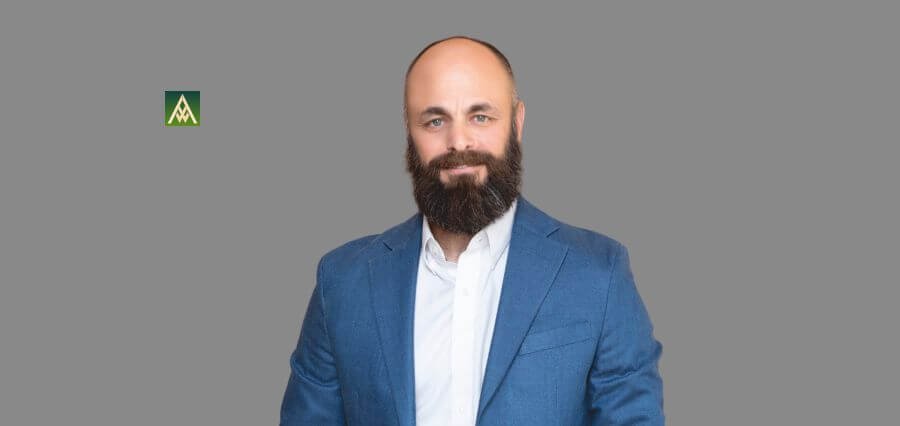Agriculture is an undertaking of patience and precision. It is an industry that’s built on trust—between farmers and the land, between businesses, communities—and between innovation and tradition. Every harvest has a story to tell—not only of seeds sown and fields reclined, but of the dedication, innovation and trust that sustain agriculture.
However, it is essential for farmers to have a reliable network of partners who ensure that agricultural advancements translate into real-world solutions. The bottom line is; agriculture is not simply growing a crop, it is all about developing relationships and impact to create lasting value for future generations.
Driven by a passion for agriculture with an eye towards sustainable growth, Benjamin Marolda serves as Chief Operating Officer at Advanta Seeds, where he adds experienced guidance and operational leadership to empower value-added services to the customers. His career journey embodies the essence of this industry that he values—trust, relationships, and understanding that comes from hands-on experience.
From the ground up, Benjamin has had the ability to work in various roles within agriculture, including as a salesperson, marketer, and close to supply chain and R&D—all roles that emphasize teamwork and involvement to be a part of the success story.
He believes in the bottom-up inclusive process of enlisting teams to take responsibility for priorities, issues, and innovative ideas. As agriculture enters the new era, Benjamin works to stay relevant with new technology and appreciates the role of biologicals, precision farming, AI-based analytics and data solutions in the future of farming.
His balanced vision includes a practical approach to innovation through a sustainability lens to continue to provide cutting-edge solutions tailor-made to the unique needs of farmers around the world.
Thus, we at Arabian World Magazine interviewed Benjamin to comprehend how he embraces technology while staying rooted in strong relationships with farmers and partners.
Below are the highlights of the interview:
Can you share the journey that led you to become the Chief Operating Officer at Advanta Seeds? What experiences shaped your career in the agricultural sector?
You should ask this question to my boss. I’m serious, but in short, I would say that my journey is all about understanding the requirements of our customers: Farmers and agriculture. Through my career, I have been able to rectify almost all areas of the organization, which has given me the background to understand the whole business.
Beginning as a trainee and gaining firsthand experience as a salesperson, I took on diverse marketing responsibilities while collaborating with key functions such as supply chain, R&D, and technology development. Working closely with finance, I remained open and proactive in seeking feedback, ensuring continuous growth and adaptability.
I think that any leader should be able to step into their team’s shoes, gaining a deep understanding of their perspectives while identifying ways to maximize their potential. I never worked for my next role.
I always focused on doing what is right for the company and the customers. I tried to be respectful and learnt the importance of being a people manager and its meaning. Making sure your team can maximize their delivery opportunities helps you in developing yourself.
As a graduate of IAE Business School and an agronomic engineer, how have your academic credentials influenced your approach to leadership?
In my opinion, it has immensely helped me to understand the mindset and perspectives of the different stakeholders we interact with. It is not a necessary mandate to be an agronomist to progress in a seed company, but it definitely helps by understanding what the business is about. This being a B2B business, where the seed is an input for the farmer to build their own profit, it helps a lot to understand and dimension the challenges they go through, the risk they get into every time they plant a seed and the value they create after they harvest and monetize their production.
When I reflect on my MBA at IAE Business School in Argentina, it’s not just about the academic excellence and transformative experience—it’s also about the invaluable networking and shared experiences with my MBA colleagues that enriched my journey.
I see many young graduates pursuing an MBA to enhance their CVs. However, one of the most valuable aspects of my Executive MBA—completed while working at Monsanto—was the ability to connect real-world business experiences with the cases we studied, bringing deeper insight and practical learning.
This really strikes you and helps you with real learnings and trains you in how to resolve the different challenges a business will set you up for.
What role does market information management play in your strategic decisions, and how do you ensure that your team stays ahead of market trends?
Market information is critical for any business. I mean, we serve a given market, and if we do not understand where it is going, we will be unable to serve it at all. Market information is not only about the customer’s needs or expectations. It is about understanding your competition to capture and maximize those opportunities that some will always offer or minimize the impacts of a smart move they might take. It helps to create a distinctive aspect and create solutions for the adversities we are trying to solve.
There are many sources of market information, and while our teams provide invaluable insights, it’s crucial to seek external data to validate our direction. It’s easy to become attached to our data or perceptions, but that can be one of the biggest traps in decision-making.
In your experience, what are the key challenges in developing effective marketing programs for agricultural products, and how do you address them?
The biggest challenge is to keep it simple. Marketeers (and I include myself in this group, but I have learnt this through personal experience), tend to build complicated programs through which farmers and distributors lose their interest and can even create the opposite reaction and move away from your products. Marketing programs should be simple and customer-centric, aligning the company’s objectives with the value they deliver to the customer.
How do you balance short-term distribution strategies with long-term goals in a rapidly changing agricultural market?
For any business to thrive, it must build trust with its customers. It means ‘Walking your talk and delivering your promises to perform.’ Short-term decisions usually result in short-term solutions. In the seed industry, the most important asset to be built by a given company is reliability.
A quick sale that leaves a customer disappointed can cost their trust in the long term, requiring significant effort to prove your reliability and win them back. We need to understand that we are here in the long run, and being trustworthy in the short run will open the doors for the longer term, giving us the opportunity to present our innovations, be heard and offer an opportunity to gain potential customers. It will put our products into the spotlight too.
Can you elaborate on your management style when leading diverse teams, especially those working remotely? What strategies do you find most effective?
My approach starts with selecting the right people, and in my experience, attitude plays a crucial role in defining them. With the right mindset, knowledge can always be gained.
Second, I do so by delegating and empowering my team members and being there to guide them as per their needs. My approach is that, if I’m empowering a team and enable them to take decisions, the goals, challenges, failures, and successes are theirs to answer for.
How do you incorporate feedback from your team into decision-making processes, particularly in areas like pricing and product positioning?
I prefer to maintain consistency in a balanced way while also considering the source of the information or feedback. I have consistently pushed myself, making strategic decisions on product pricing and positioning in various situations, presenting them not only to my team but also to my superiors throughout my career. I have always felt that it is my responsibility to maximize opportunities. They can come through pricing, or they can come through a different approach. In my opinion, pricing is capturing value.
I have seen companies failing miserably on aggressive pricing approaches because of poor demand generation activities, when compared to the value perceived by farmers. The evolution of farming is propelled by technological advancements and the continuous creation of added value. Every farmer will be willing to share part of a given profit if there is a fair part for them to improve their business. It is about ensuring there is value behind the pricing and that the understanding of the company’s value is in sync with the farmer’s perceptions.
What innovations in agricultural technology do you believe will have the most significant impact on the industry in the coming years?
Yield, Yield and Yield.
To meet growing demands, we must produce more using the same or fewer resources. Yield per hectare will continue to drive agriculture and technology adoption, but in today’s world, yield is not just about potential—it must be predictable and achievable amid climate challenges.
As a result, hybrids and crops with greater resilience to climate stressors will play an increasingly vital role in global crop rotation. Technology in agriculture serves to protect or enhance a product’s potential, but it cannot replace the fundamental need for strong hybrid development. Companies that rely solely on technology without prioritizing hybrid advancements risk overlooking key lessons from both history and agriculture.
That said, technologies that accelerate breeding cycles or enhance disease and herbicide tolerance will undoubtedly contribute to improved yield potential. However, no technology can compensate for a weak-performing product—it must be built on a solid foundation.
As of now, a wide range of agricultural technologies is being developed globally, including biologicals, fertilizers, advanced ground and aerial machinery, precision farming, variable inputs, big data generation, and AI-driven analytics. The value these innovations bring varies by region, depending on factors such as farm size, crop share in rotation, local government regulations or incentives, and the specific challenges or opportunities unique to each area.
As someone with interests in rewilding and craft beer, how do these passions inform your professional life or decision-making?
I have a deep love for nature, and with that love comes an inherent respect for it. I believe in passing down to future generations a world that is as good as—or better than—the one we inherited. I hope we all recognize the importance of preserving the balance of nature, as we depend on the world we live in just as much as it depends on us.
And I also hope we understand there is no way to live without impacting the environment. So, like everything in life, it is about balancing how we develop our activities by minimizing the impact on our environment.
This is reflected in everything we do at Advanta Seeds. Alongside many other agricultural companies—and most importantly, farmers—we play a vital role in increasing yields and developing more reliable crops to sustain humankind while minimizing environmental impact. This effort also extends to emerging trends like biofuels, which contribute to a more sustainable future.
Craft beer and fly fishing—whether in my beloved Patagonia or anywhere—are my ways of embracing nature responsibly. They help me clear my mind, refresh my spirit, and stay energized to pursue my professional responsibilities with renewed focus.
Looking ahead, what advice would you like to give to those professionals pursuing a career in this field?
I’ll say, never compromise the future for the present. Agriculture is one of the most rewarding industries to work in, where personal relationships and trust are the true drivers of growth and success. There are no shortcuts in this field—patience, honesty, and passion are essential. Always play as a team, both with your colleagues and your customers, to build a sustainable and thriving future.
Read More: Alaa Obeid: Driving Operational Excellence in the Middle East’s Healthcare Sector




